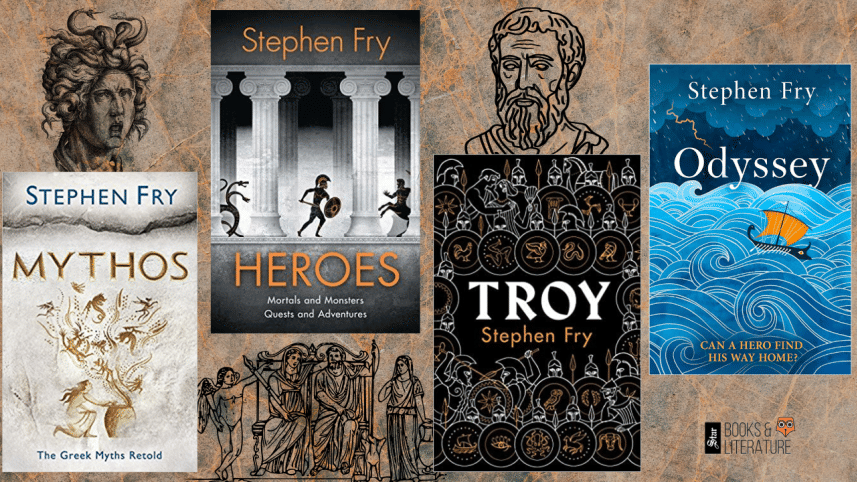A bit of Fry & Homer

There is a telling moment in St. Augustine's Confessions where the future saint, having gorged himself on the pagan classics, laments that he "...weeps over the death of Dido dying for love of Aeneas, but not weeping over himself dying for his lack of love for […] God". This terror of being seduced by a mere story, this guilt-ridden suspicion of narrative, is an Augustinian neurosis. The Greeks, in contrast, would have been baffled by it. Their gods were liars, their heroes accomplished tale-spinners, and their foundational epic of homecoming is centered not on a warrior of principle, but on a man whose chief virtue is a capacity for sublime duplicity. For the Greeks, the story was not an obstacle to truth but a vehicle for it, and in Stephen Fry's retelling of this entire world, through Mythos (2017), Heroes (2018), Troy (2020), and culminating in his latest, Odyssey (2024), we are invited to ride along without an ounce of Augustine's anxiety.
Stephen Fry's series, from the creation stories of Mythos and the monster-slaying of Heroes to the martial gore of Troy and now the cunning of Odyssey, is an undertaking of remarkable scale. But this seems less like a retelling, and more like a performance. Fry is always present, his avuncular, witty persona mediating every scene, translating every divine thunderclap into a wry aside. He stands in a line not so much of scholars like E V Rieu or Richmond Lattimore, but of great theatrical interpreters. The crucial distinction is that a scholar aims for transparency, to give the reader a clear window onto the original. A performer, however, holds up a mirror. As I was reading Fry's series, I felt less like seeing Homer's world and more like seeing a reflection of Stephen Fry's, which is, frankly, what I was looking for before I started. I was not seeking a dusty, literal translation but an interpretation. And the wit, the humanity, and the distinctly modern sensibility that he brings to the material might have resulted in a less authentically archaic version, but it is infinitely more companionable.
His primary tool for achieving this companionable tone is the anachronistic aside, a device he deploys with the cheerful confidence of a master showman. When describing the primordial state of the universe in Mythos, Fry is there to ask us whether it could be "a kind of terrible mess, like a teenager's bedroom only worse". Fry understands that the motivations of these ancient figures, their obsessions with honour, piety, and fate, can seem alien to us. His solution is to build a bridge of familiar absurdity, allowing us to grasp an abstract concept like divine retribution by explaining that "Holmes was Moriarty's Nemesis, Bond was Blofeld's and Jerry was Tom's".
The performance, however, is not confined to the main text. One of the chief delights and most telling features of this series is Fry's masterful use of the footnote. This is certainly not the dry citation of an academic but a second stage upon which Fry performs a running show. Here, in these asides-within-asides, Fry plays the etymologist, the historian, the disgruntled pedant, and the gossipy raconteur. He uses this space to confide in the reader, to share linguistic tidbits, to correct Homer's geography, and to offer personal anecdotes. It is here, in the margins, that the illusion of a seamless retelling is intentionally broken, and the author steps out from behind the curtain to remind us that we are in the hands of a thoroughly modern, and brilliantly opinionated, guide.
The world of the Greek myths is, by any modern standard, a deeply patriarchal one, and Fry is too honest a narrator to pretend otherwise. Where he excels, however, is in his refusal to treat his female characters as mere plot devices. He consistently pauses the action to explore their motivations and highlight their strengths, praising Penelope's formidable intellect, giving weight to the arguments for Clytemnestra's actions, and finding the nuance in Helen's tragic position. He doesn't dismantle the patriarchal structure of the ancient world. What he does, with remarkable success, is ensure that the women who inhabit that world are presented not as pawns, but as complex, intelligent, and formidable characters in their own right.
The sheer scope of Fry's undertaking is what sets it apart from the current literary crop. Natalie Haynes is one of our finer tour guides to the women of the epics, Jennifer Saint a superb chronicler of their sorrows, Madeline Miller the masterful narrator of the single, tragic relationship, Pat Barker the unflinching witness to their enslavement, and Costanza Casati the psychologist of a single, vengeful queen, but their projects are, by design, focused and specific. Fry is not a miniaturist but a grand chronicler, undertaking the task of retelling the entire saga. He is the last of the great encyclopedists. This is not to say his work is shallow; rather, its depth comes from connection, as evident in the story of Persephone in Mythos which is echoed in the grief of the mothers in Troy. His series is a work of synthesis and curation on a scale that few, if any, of his contemporaries have achieved.
When Alexander Pope published his translation of the Iliad, the scholar Richard Bentley was said to have remarked, "It is a pretty poem, Mr. Pope, but you must not call it Homer". The criticism, for all its academic accuracy, misses the point entirely. Pope knew, as Fry surely does, that a true rendition is not a matter of slavish, literal fidelity, but of capturing a spirit and reanimating it for a new age. Fry's tetralogy, although prosaic, is, in the best possible sense, a very pretty poem indeed. He has taken a large chunk of the Greek myths and made them speak in the warm, witty, and deeply humane voice of a master storyteller. Augustine can keep his anxieties; we have stories to enjoy.
Najmus Sakib studies Linguistics at the University of Dhaka. Reach him on X at @sakib221b



 For all latest news, follow The Daily Star's Google News channel.
For all latest news, follow The Daily Star's Google News channel. 
Comments